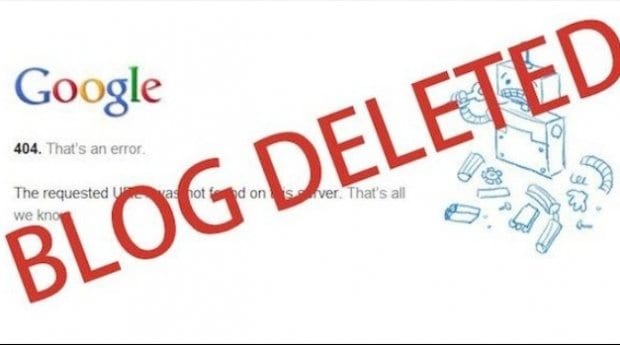Three days after abruptly announcing that blogs on its Blogger platform containing adult content would be delisted, Google changed its mind.
The new policy would have swept countless blogs off the face of the web, making them accessible by personal invitation only.
Google’s initial announcement sparked enraged responses from The Guardian, where tech writer Zoe Margolis called Google’s actions “arbitrary prudishness,” and prolific porn advocate Violet Blue, who accused the company of going after content it “simply does not like.”
On Feb 26, Google offered a meek retraction on its product forum: “We’ve had a ton of feedback . . . about the negative impact on individuals who post sexually explicit content to express their identities. So rather than implement this change, we’ve decided to step up enforcement around our existing policy prohibiting commercial porn.”
The upshot is that Google will continue to require a warning page on blogs with sexual content, and continue to ban using such blogs for commercial interests.
This is not the first time Google has cracked down on adult content on Blogger, though last time it stuck to its decision. In 2013, the company banned making any money off sexually explicit Blogger sites, be it through direct sales, advertising sexual services, or even putting up banner ads. The internet is now littered with old Blogger sites from 2013 with apologetic notes from porn stars, kink-dungeon owners and dominatrices going offline or switching to different domains.
One of the Blogger refugees was Jon Pressick, a Toronto sexuality writer who publishes choose-your-own-adventure erotica books, and co-hosts the Sex City radio show. When Google banned making money off his site, he ditched and found his own domain.
“That’s when I said, ‘nope, I’m done, at some point I need to make money off this thing,’” he says. “They received such a hue and cry about monetizing. It was a huge deal. So I was surprised they backed down from this one.”
Pressick thinks Google’s decision to crack down on sexual content didn’t make any sense, and the company realized it. “Google is the search engine where you can find every bit of adult content in the world,” he says. “They offer it up as videos and images and blogs and everything. I think some saner heads must have prevailed.”
That’s good news for people like Pressick who depend on companies like Google, Twitter and Facebook to publicly talk about sexuality.
Social media “is brutally important these days,” he says. “Someone sent me an email today asking to get on my mailing list. Well, I don’t have a mailing list. You just follow me on Twitter. Mailing lists are years ago now.”
If the changes had gone through, Pressick points out, it would not just have been porn that would suffer. Blogs on sex education, LGBT issues, pregnancy, and all the other smaller fish in the pond would lose out. And when companies crack down on sexual content, minorities tend to take the brunt.
On Pressick’s suggestion, I strolled down to the nearest McDonald’s, and logged on to the company WiFi. It was no trouble to browse mostly-straight dating sites Plenty of Fish and OkCupid, or any straight personals listing. Trying to log onto Squirt, however, landed me with an error message, as did gay dating site Onlylads.com. It was easy enough to browse mild sex tips on the Cosmopolitan website, but kink site Fetlife.com was blocked. As Pressick predicted, in some companies’ eyes not all sexual content is equal.
Even without the new rules, some bloggers say that Google discriminates in the same way. Jeff Patcher, a blogger from California, started keeping track in 2009 of how Google underhandedly closes gay blogs. His ’90s-style blog, complete with flashing GIFs and rainbow type, has since been taken over by another blog-preservation activist, who continues to painstakingly record thousands of gay blogs closed by Google due to “spamming” issues.
“This all started long before Google’s most recent announcement of banning adult content,” the blog’s current owner, who only gave the name Brent, told me by email. “The reason that they have been closed is the million-dollar question still to this day.”
Despite threats by Google, Pressick believes that in the end, sex online will always win out. “It always comes back. It will always be there,” he says, “and trying to do enforcement when everything was so wild-west for so long seems like a fruitless endeavour. You can’t keep the playground open for years and years and then suddenly close it off.”
Daily Xtra reached out to Google for comment on this article, but received no response.


 Why you can trust Xtra
Why you can trust Xtra


